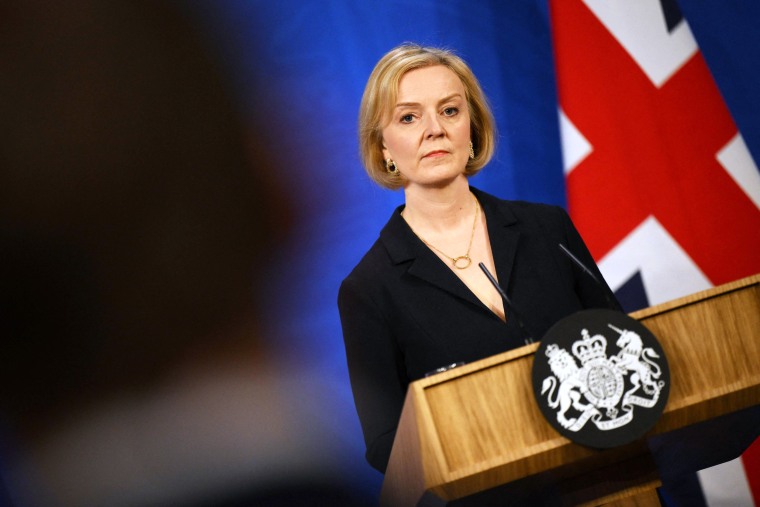U.K.’s new finance chief warns of ‘difficult decisions ahead’ amid political and market turmoil
LONDON — The U.K.’s new finance minister warned of “difficult decisions ahead” on Saturday, the morning after he had replaced his predecessor who was only 38 days into the job.
Jeremy Hunt told a range of British news broadcasters that tax cuts promised by embattled Prime Minister Liz Truss would not be as big as first thought, and government departments would have to cut their budgets.
Warning of “difficult decisions ahead” Hunt told British broadcaster Sky News: “Some taxes will not be cut as quickly as people would want, some taxes will go up.” (Sky News is owned by Comcast, the parent company of NBC News.)
He added that “all government departments are going to have to find more efficiencies than they were planning to,” hinting at a return to austerity economics, a fiscal policy favored by successive leaders of his ruling Conservative Party in the aftermath of the 2008 financial crash.
Hunt also reiterated a statement from Britain’s Treasury Friday that said he would set out the government’s medium-term fiscal plan on Oct. 31.
He relayed a similar message to several other British broadcasters as he attempted to distance himself from his predecessor, Kwasi Kwarteng, who was axed Friday after weeks of market panic stoked by the economic plan he laid out last month.
Kwarteng became the second shortest-serving chancellor of the exchequer, as the British finance minister is known.
Amid speculation that she could also be ousted just weeks after taking office, Truss told a news conference Friday that she had changed course “to reassure markets of our fiscal discipline.”
She was also seeking to reassure Conservative Party members whose polling numbers have plummeted alongside the value of the pound.
“The financial crisis the U.K. currently finds itself in was unfortunately avoidable,” George Dibb, head of the Centre for Economic Justice at the Institute for Public Policy Research, a London think tank, told NBC News Saturday.
Earlier this month, after repeatedly rejecting any suggestion of changing course, Truss scrapped a proposal to cut taxes for those earning more than 150,000 pounds a year ($167,000).
That failed to calm markets or lawmakers.

The plan called for cutting 45 billion pounds in taxes ($50.4 billion) — more than the United Kingdom’s annual defense budget — but without identifying either how this would be funded or what services would need to be cut as a result.
The proposal saw interest rates and mortgage payments rise, the value of the pound crash and the government’s cost of borrowing soar. More details on this were due to be revealed in a speech Oct. 31, but the political and economic damage had already been done.
The central Bank of England was forced to step in and buy billions of pounds of government bonds, known as gilts, to calm the market. As it did so, the bank warned of a “material risk” to the U.K.’s entire financial system.
On Tuesday, the bank said it intervened to stop a “fire sale.” Crucially, the bank’s bond-buying program was set to end Friday, meaning the government had to convince markets its economic plan was sound enough to avoid further chaos.
The International Monetary Fund strongly criticized the unfunded tax cuts, while economists and commentators across the world questioned the wisdom of such a radical plan.
“While the sacking of Kwarteng and the U-turn on some of the unfunded tax cuts might offer a little breathing space, it appears that the damage has already been done, not just to the economy but also to trust in this government,” Dibb added.
Although Dibb agreed with Hunt’s assessment that tax rises were likely necessary, he said, “after a decade of austerity, there are no more public sector cuts available to make.”
Rumors are already swirling that senior Conservative Party members are plotting how to remove the prime minister from power and, for Anand Menon, a professor of European politics at King’s College London, “the question is whether Liz Truss can survive into next week.”
Britain’s last two prime ministers, Theresa May and Boris Johnson, both resigned after internal strife in the Conservative Party made their positions untenable. Truss is Britain’s third prime minister in six years.
Menon added that the government’s options were increasingly limited, and that a poor market reaction to Jeremy Hunt’s media appearances would leave the British government with no choice but to make further U-turns.
Source link
from World eNews Online https://ift.tt/6u4HrdL
via World enews
Labels: news, World eNews Online, worldnews



0 Comments:
Post a Comment
Subscribe to Post Comments [Atom]
<< Home